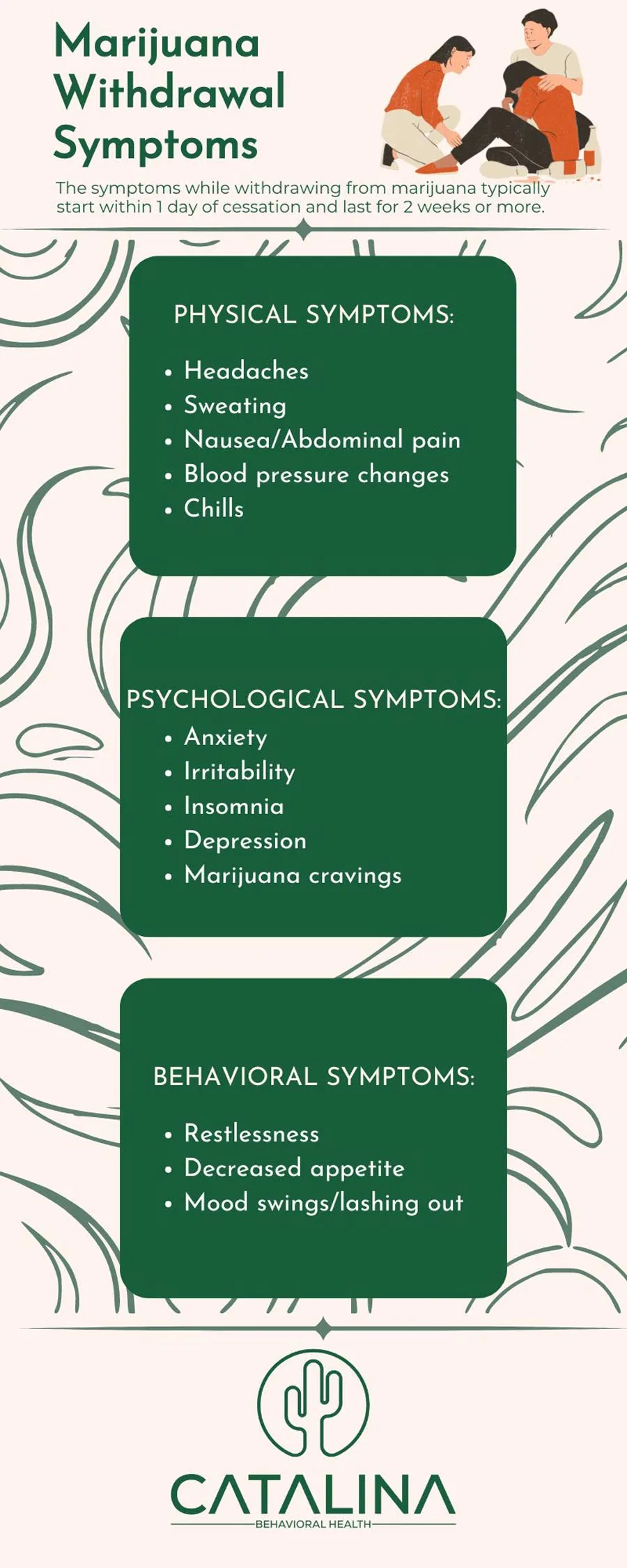Understanding the Nature of Cannabis and the Central Nervous System
Some people say they use marijuana to get high, and others say they like the chill feeling they get. That prompts non-users to ask themselves: Is marijuana a stimulant or depressant? Marijuana fits into neither box exactly. It can have a stimulant effect, increasing the heart rate. But it can also act as a depressant or have sedative effects, helping to induce a feeling of relaxation.
To make things even more complicated, some people enjoy the hallucinogenic effects of marijuana. Its effects vary due to the different strains and amounts used. There’s not a single way to categorize it.
Catalina Behavioral Health is committed to helping people make a complete recovery from alcohol and drug abuse and other mental health conditions. Our Tucson, Arizona, facility understands how cannabis can impair brain function as much as any prescription painkillers.
While marijuana is legal for recreational use in Arizona, we also recognize that Marijuana Use Disorder can co-occur with other substance use disorders or mental illnesses. We effectively treat mental health conditions either with or without a co-occurrence of alcohol or drug abuse.
Keep reading to learn more about the nature of marijuana’s effects on the central nervous system and the need for evidence-based treatment for those who have become dependent.
Get Effective Marijuana Detox and Rehab Options
When Is Marijuana a Stimulant?
Some marijuana, especially with concentrated amounts of THC, can act like a stimulant. People find that it can increase alertness and give them a euphoric feeling. They enjoy the energy boost and feel like they can get more done. Creative people may draw inspiration due to their heightened sensory perception.
Those mood-elevating effects may all seem like a good thing at first glance, but there’s a dark side. The physical effects of marijuana as a stimulant include a higher heart rate, anxiety, or paranoia.
Marijuana is not a stimulant in the sense of prescription drugs that doctors may prescribe to manage ADHD, for instance, and is much shorter acting. To get that high again, users start taking higher, more frequent doses and can become addicted to it. With all that considered, it might not be worth the risk of taking marijuana to elevate your mood.
When Is Marijuana a Depressant?

On the other hand, you might wonder: When is marijuana a depressant?
Marijuana with a high CBD content may have more depressant effects, as well as CBN, another non-psychoactive component of many cannabis products. The depressant effect produces calming or soothing effects for people who struggle with sleepless nights or just want to calm down.
These calming effects are similar to benzodiazepines, prescription drugs that doctors recommend for managing anxiety or stress.
The side effects of using marijuana as a depressant include impairment, slowed motor skills, and lower energy.
How Marijuana Addiction Changes Brain Function
Using marijuana heavily, especially over an extended period, affects the brain’s endocannabinoid system. That’s the part of the brain that’s responsible for mood regulation, memory, and pleasure.
After regular, extensive use, the brain starts to depend on marijuana, an external cannabinoid, instead of continuing to produce cannabinoid chemicals on its own. Eventually, that changes how the brain processes the pleasure hormone dopamine. It becomes difficult to release dopamine in order to experience life’s pleasures without cannabis.
According to the American Psychological Association, cognitive tests also show that marijuana can decrease memory, attention, and decision-making because it changes the hippocampus and prefrontal cortex. Those are the brain regions that engage when we need to control our impulses or other important human cognitive functions.
The World Health Organization Warns Against Recreational Marijuana Use
The World Health Organization (WHO) published a 2020 reclassification of cannabis. While it now recognizes the potential medical benefits of some cannabis products, specifically CBD, the organization still warns that using cannabis without a doctor’s guidance leads to public health risks.
WHO is especially concerned about the disruptions Marijuana Use Disorder causes to people who have a mental illness and youth.
How Does the Brain Communicate With the Central Nervous System, and How Does Smoking Weed Impact It?

The brain communicates with the central nervous system similar to a cell tower network. Neurons, the signal transmitters, send and receive the information necessary for the body. Just as cell towers are relay stations for data and voice calls, neurons convey messages back and forth between the brain and the nerve cells.
But marijuana can interfere with this efficient system of signals, much like storm disruptions can reduce the quality of your phone calls. Weed distorts these communications, causing miscommunications, changes in sensory perception, and slow response times. The physical symptoms of this disruption appear when you notice someone who can’t conduct motor tasks successfully.
Get Accredited Treatment Programs at Catalina
The Progression from Recreational Use to Marijuana Addiction
Here’s a brief overview of how marijuana use can be problematic:
First Use (Often Peer Pressure in Youth)
Becoming dependent on any drug, marijuana addiction included, starts with the first use, often due to peer pressure in youths or young adults. They start consuming marijuana with their friends, often as a way to fit in. They want to be one of the “party people,” and smoking week helps them gain that notoriety.
Developing Tolerance for Weed
As use progresses, the person begins to enjoy the pleasant effects of smoking week. To get that same feeling, they’ll increase how often they smoke or increase the dosage to get high.
Becoming Physically Dependant on Cannabis
The progression continues as the brain starts to depend on marijuana. This is where “X” marks the spot and the recreational use escalates to the realm of problematic usage. They’ll use it more frequently, even if it interferes with their education, careers, or relationships. It’s becoming all about getting high, despite the consequences.
Also at this stage, they cannot quit without an uncomfortable withdrawal. They’ve lost control over their once-recreational partaking and need help to get clean and sober.
The Negative Effects of Marijuana, a Stimulant and Depressant

Because marijuana is a natural hemp plant product and has become available to purchase and use in many states, people have let their guard down when using it.
Here are some of the possible outcomes of taking frequent or large doses of cannabis:
Marijuana and the Cardiovascular System
Smoking weed (and taking other drugs) can strain the cardiovascular system by increasing both heart rate and blood pressure. These can create an increased risk for anyone with pre-existing heart conditions. Marijuana also has blood-thinning properties, leading to clotting and blood flow issues.
While recreational and medical marijuana have some therapeutic applications, it’s still highly addictive. Those with heart or circulation issues should weigh these considerations.
Smoking Weed and the Digestive System
Some marijuana users have turned to it for relief from chronic pain and muscle spasms in the digestive system, especially in people who live with uncomfortable conditions like IBS. However, marijuana also causes some rather unpleasant effects. Among those are nausea, vomiting, and appetite changes with extended use and higher doses.
Marijuana Abuse and Public Health-Related Problems
Mental health advocates are concerned about the public health problems stemming from marijuana abuse or addiction. Adolescents who use marijuana are likelier to face academic struggles and disengage from their education altogether. That means there’s a higher school dropout rate for youth who use weed or illicit substances.
Besides that, using weed increases the strain on public emergency rooms due to adverse effects, driving accidents, and drug overdoses or alcohol poisoning when they mix weed with other drugs.
Marijuana’s Impact on Psychiatric Disorders
Marijuana use interferes with the body’s natural stress response, which the endocannabinoid system regulates. That can lead to numerous issues, from mild paranoia after use to triggering psychotic episodes.
The psychological effects can endanger people who struggle with common mental health concerns like severe depression or bipolar disorder. The falsely elevated moods after using weed can make them have a sense they’ve been treated and healed, so they stop using their prescription or taper them down to lower doses without taking advice from a doctor.
Marijuana Use and Hallucinations

Smoking weed can also have hallucinogenic effects, especially strains with high THC content or when cannabis use occurs in high doses.
Hallucinations change a person’s perception. They experience time distortion or have false perceptions of the world due to the hallucinogen in their system. This altered sense of the world can cause disorienting sounds or visions, which can be disorienting or even scary.
People who take psychoactive drugs fall into a danger zone when using weed recreationally. These hallucinations can worsen schizophrenic symptoms, for instance. These can trigger a schizophrenia relapse or have adverse effects on their long-term mental health.
How Long Can the Hallucinations from Marijuana Last?
The timing of the hallucinogen can last in the system varies from a few hours to up to 24 hours. That largely depends on the amount taken and potency of the marijuana and an individual’s tolerance. The hallucinations and altered sense of being start to decrease as the drug metabolizes and leaves the system.
Some People May Experience Sudden Psychosis from Cannabis
Sudden psychosis describes a mental state that happens when someone completely loses touch with reality. They may have delusions, hallucinations, or develop extreme paranoia.
This can happen to anyone, even marijuana users who don’t have a history of mental illnesses. It’s most likely to occur after using highly addictive, high-potency products. Although not common, this can also occur in the case of cannabis withdrawal psychosis.
Does Marijuana Produce Withdrawal Symptoms?

Some mistakenly think that marijuana use is safe because they won’t have withdrawal symptoms when they stop using it. But that’s a myth.
Marijuana withdrawal is generally less intense than some illicit drugs (ex: heroin or meth). However, the symptoms can still be uncomfortable, especially for the heaviest users.
- Irritability
- Anxiety
- Insomnia
- Decreased appetite
- Restlessness
- Depression
- Headaches
- Chills
- Blood pressure changes
- Sweating and night sweating in particular
- Nausea
- Abdominal pain
- Intense cravings for marijuana
Because of these symptoms, especially the psychological effects, you should not stop marijuana use on your own. Instead, seek help from a local marijuana detox center such as Catalina to ensure your safety.
Up To 100% of Rehab Costs Covered By Insurance
Connect with Catalina for Help With a Marijuana Use Disorder
If you or a loved one are struggling with marijuana abuse or addiction and need help to stop using it, consider Catalina Behavioral Health as a personal support system. We will guide you through the process of healing from detox to aftercare planning.
We work with most major insurance coverage for rehab, including many in-network, and accept some forms of AHCCCS as well.
Getting started on the pathway to a new, sober life is as simple as making one confidential call to Catalina. Let’s get you on the road to recovery today!





